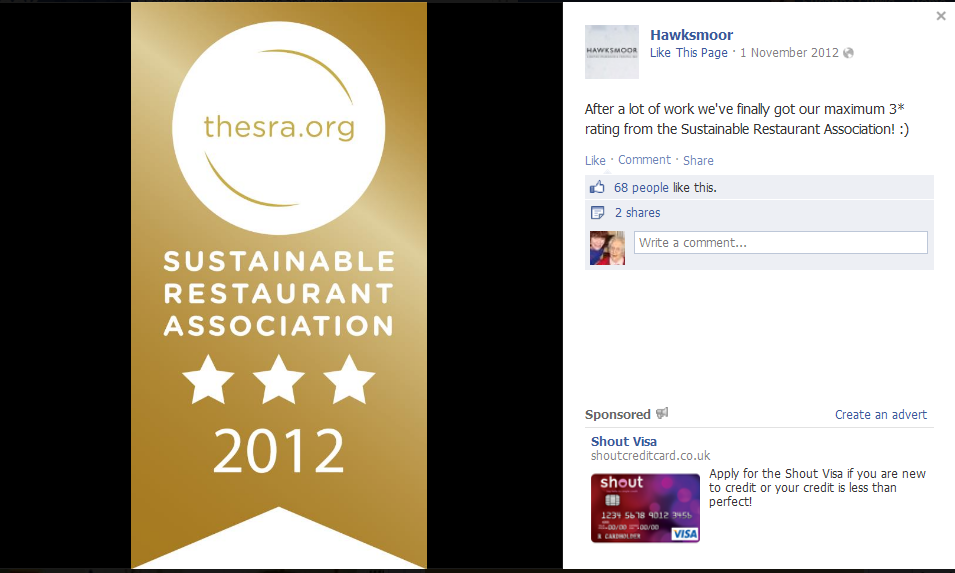How to talk sustainable, local and seasonal on Social Media
Are you one of the growing number of food and drink businesses that cares about using local, seasonal and sustainably sourced products? If so, please listen up as I believe you’re sitting on a mountain of engaging social media content.
Unlike many businesses out there who are simply interested in making more sales transactions, you have a point of positive difference to offer. I believe when you care about the source of the food and drink you supply, you have an opportunity to connect with your customers on a more emotional, feel-good level. And to my mind, nothing is more powerful in marketing than when you are able to encourage this type of connection.
Unfortunately, I’ve come across too many food and drink businesses who are privately driven by sustainable values but who have squandered this opportunity to connect on a more emotional level with customers.
To illustrate how sustainable practices can be added to the social media marketing mix for restaurants, bars and cafes, I did some research this morning and put together a Pinterest board to showcase some interesting examples.
Example #1: Hawksmoor restaurant celebrates that fact that they’ve just won 3 stars, the highest level grade awarded from The Sustainable Restaurant Association. This simple post received 68 likes on Facebook, so the news is clearly a winner with the customers too.
Example #2: One of the Hawksmoor team visits a herd of Belted Galloway cattle who are destined to be served as beef steaks at the restaurant. Sharing details of your relationship with your local food suppliers quietly speaks volumes about the quality of your offer.
Example #3: The local credentials of this bottle of Pale Ale from Bermondsey brewer The Kernel goes viral as a photograph on Instagram with the help of a #kernelbrewery hashtag.
Example #4: Goliath Sportswear likes to associate itself with innovative, quirky, grassroots businesses who are backed by a strong values-based ethos. As part of their brand strategy, Goliath spent some time documenting the work of The Farm Shop in Dalson which resulted in an online video and a series of sponsored Pinterest photos. For example, in the Pinterest gallery photograph below, we can see a gig taking place in the veg growing polytunnel which sits to the back of the cafe building. The Farm Shop is a fantastic example of a sustainable business as it is grows its own veg, keeps chickens on site and works with other local suppliers. I think this innovative sponsorship and storytelling approach also offers a taste of future marketing initiatives where brands with shared values partner and mutally expand their following on social media.
Example #5: The Table Café in Bermondsey, South London has taken supplies of fruit and vegetables from a local homeless charity garden project over the past few years. As a story, it’s got fantastic human interest and it’s not surprising it was promoted within a recent magazine article. Of course, all traditional media can also be recycled on online. In this case the article was saved as a photo and then re-shared on the restaurant’s Facebook page with their 900 plus fans.
Example #6: Cambridge-based baker Afternoon Tease name checks the local, seasonal rhubarb that’s made its way into her latest Sticky Ginger and Rhubarb creation on her Instagram account. This is a great example of how simple sustainability marketing can be.
Example #7: The new sustainable superfood of the future will be insects according to the current media buzz. Following on that trend, grasshoppers are being offered on the menu at the Wahaca Southbank Experiment. Customers are encouraged to vote #ChapulinYES or #ChapulinNO on Twitter after trying out this new dish to see if this trend has actually got legs, pardon the pun! ;-)
Example #8: It doesn’t always have to be about the food and drink. Wahaca offer a Sustainable Chauffeur Driven Date every day during Climate Week through their website and a Facebook promotion.
A few more thoughts before I sign off. The main thing to remember is to keep your audience in mind when you put your sustainable message together. If your message is too serious and heavy you may just switch people off. However, if you can encourage engagement through fun voting on Twitter like Wahaca, if you tell your story through attractive photographs or if you simply go for short and sweet newsflashes, you are then on track to successfully sharing your values without labouring the message too much.
Have any of the above examples provided you with some food for thought? Or have you got examples of sustainable marketing you’d like to share. Please add your comments below if you’d like to contribute to the discussion.








